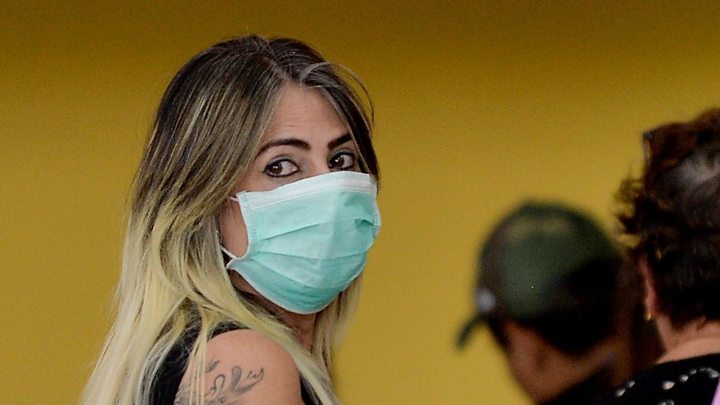
Face masks, gloves and other protective gear can help stop the spread of coronavirus in the right circumstances, but there has been a lot of discussion about who should use them.
World Health Organization (WHO) special envoy Dr David Nabarro has suggested that more widespread use of masks will become "the norm" as the world adjusts to living with Covid-19.
Why doesn't everyone wear a mask now?
Coronavirus is spread by droplets that can spray into the air when those infected talk, cough and sneeze. These can enter the body through the eyes, nose and mouth, either directly or after touching a contaminated object
The World Health Organization says it remains the case that medical masks should be reserved for healthcare workers, not the general public.
Only two groups of people should wear protective masks, those who are:
- sick and showing symptoms
- caring for people suspected to have the coronavirus
Masks are not recommended for the general public because:
- they can be contaminated by other people's coughs and sneezes or when putting them on or removing them
- frequent hand-washing and social distancing are more effective
- they might offer a false sense of security
How might things change?
Dr Nabarro told Radio 4's Today programme that healthcare workers and those with symptoms remained the priority, especially given the worldwide shortage of the best quality masks.
But he said masks might also need to be worn by non-medical workers who are in frequent contact with others and who can't distance themselves, such as people operating cash registers, or hairdressers.
Among society as a whole, he said that he expected "some form of facial protection is going to become the norm", not least to offer people reassurance when they encounter others.
But Dr Nabarro warned against complacency: "Don't imagine that you can do what you like when you are wearing a mask. [It] doesn't give you the excuse to disregard social distancing."
The UK is not advising most people to wear either medical or homemade masks.
Sir Patrick Vallance, the UK's chief scientific adviser, says there is a review ongoing at the moment and it has already seen "more persuasive" data on it stopping you passing on the virus, rather than catching it. However, the advice has yet to change.
Do homemade face masks work?
Americans are advised to use clean cloth or fabric to cover their faces whilst in public. Officials say medical masks are in short supply and should be left for healthcare workers.
Only the sick, or those caring for patients of coronavirus, had previously been told to wear masks. But US officials hope the new rules could stop people without symptoms unknowingly spreading coronavirus.
However, reusable cloth masks are also not recommended and may even increase the chance of infection, say European advisers.
They say there is a high chance virus particles could go through cloth. Problems with moisture could also mean the cloth retains the virus, they warn.
There is lots of advice on how to make face masks online, with some sites suggesting the best options.
However, homemade masks are not regulated whereas officially-made ones have to meet safety requirements.
What do I need to know about the coronavirus?
What is the best type of mask?
In hospitals, different types of mask offer different grades of protection.
The most protective is an FFP3 or, alternatively, an N95 or an FFP2.
Experts do not recommend the public use these masks. They are for healthcare workers in close contact with coronavirus patients and at highest risk of encountering infected airborne droplets.
Other NHS staff in lower-risk situations can wear a surgical mask, latest guidelines say. That means healthcare workers within one metre of a patient with possible or confirmed Covid-19, and it includes staff working in hospitals, primary care, ambulance trusts, community care settings and care homes.
What else can protect against coronavirus?
Gloves and other protective wear are recommended for NHS staff working in places where they could encounter coronavirus.
Again, staff in the highest-risk scenarios are advised to wear fuller protection, rather than a simple apron, gloves, mask and goggles.
The general public are not advised to wear gloves or any other protective gear.
To protect yourself from coronavirus, the NHS recommends:
- Wash hands with soap and water often, for at least 20 seconds and immediately on returning home
- Use hand sanitiser gel if soap and water are not available
- Cover your mouth and nose with a tissue or your sleeve - not your hands - when you cough or sneeze
- Put used tissues in the bin immediately and wash your hands afterwards
- Do not touch your eyes, nose or mouth if your hands are not clean